Tisane sounds so old fashioned, but that may just be the fact that I associate the word with Agatha Christie’s fussy little Belgian detective, Hercule Poirot. I can just see David Suchet, the actor who plays the character, ask his secretary, Miss Lemon for his tisane. No English tea for Poirot!
Tisane is actually a French word meaning tea – specifically infused leaves (such as scented geranium, lemon verbena, sage), hips (such as those from roses), flowers (for example, linden and hibiscus), seeds (e.g. fennel), peel (such as citrus), roots (like ginseng, ginger, liquorice), weeds (such as nettle, dandelion), spices (e.g. cinnamon). In other words, anything organic with flavor to impart to the boiling water. Tisanes are often touted as rich sources of antioxidants and certain combinations are used as home remedies for sleeplessness, upset stomach, sore throat and other similar ailments.
Most cultures have traditional tisanes or herbal teas, not least Greece. The photo above is the stock in a shop in the old market in the major northern Greek town of Thessaloniki that specialises in spices and herbal teas (τςάι). Similar shops with bags of τςάι can be found along Αθηνάς Street, the area of numerous traditional covered and open air markets, running between Monastaraki and Omonia Squares here in Athens.
To translate a few of the labels above: lemon balm (ΜΕΛΙΣΣΑ), calendula (ΚΑΛΕΝΤΟΥΛΑ), mallow (ΜΟΛΟΧΑ), rose hips (ΚΥΝΟΡΟΔΟ), hibiscus (ΙΒΙΣΚΟΣ), elderflower (ΣΑΜΠΟΥΚΟ), polykompi or wild mint (ΠΟΛΥΚΟΜΠΟ), nettles (ΤΣΟΥΚΝΙΔΑ), hyssop (ΥΣΩΠΟΣ) and eucalyptus (ΕΥΚΑΛΥΠΤΟΣ). Common herbal teas in Greece also include wooly sage (φασκόηλο), Greek mountain tea (dried leaves and flowers of Sideritis syriaca), chamomile, red saffron, linden flowers, and the list goes on.
One tisane that I particularly like that is easy to produce at home is a tea using dried apple peel. This tisane or tea is usually associated with Turkey, but is also drunk in Greece. It is a perfect way to make use of those peels from making apple butter, apple sauce or apple jelly. My first batch of apple peel tea here in Greece was an offshoot of making apple butter – comfort food from my childhood.
Apple Peel Tisane
My recipe is based on one in The Mediterranean Pantry by Aglaia Kremezi. The dried tea takes several hours to make, but can keep up to a year if sealed and stored in a dry place.
Dried Apple Tea
- Peel from 10 to 12 Organic Apples (free of pesticides)
- 1 stick (about 2 to 3 inches long) of Cinnamon
- 3 to 4 whole Allspice berries
Preheat oven to 80 degrees C. Place the peel directly on the rack in the oven and let dry for 4 to 5 hours. Let them cool and break up into small pieces. In a mortar, lightly crush the cinnamon stick and allspice into small bits, and add to the apple peel. Seal in a container with a tight fitting lid. Store in a dry place.
Apple Peel Tisane (for two)
- Dried tea (above) – approximately 2 rounded spoonfuls (or more according taste)
- 300 to 350ml water
- Honey (optional)
In a small saucepan – or μπρίκι (a special pot for making Greek/Turkish coffee) – add the tea mixture and the water. Bring to a boil and let it simmer for at least 4 minutes. Strain and serve with the honey.
It tastes like cold days in by the fire, hot cider/apple juice with spice. A great way to make use of those apple peels.
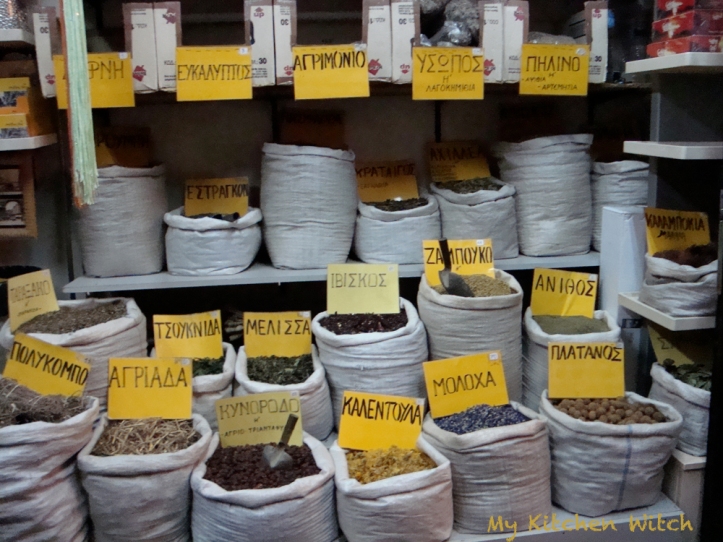
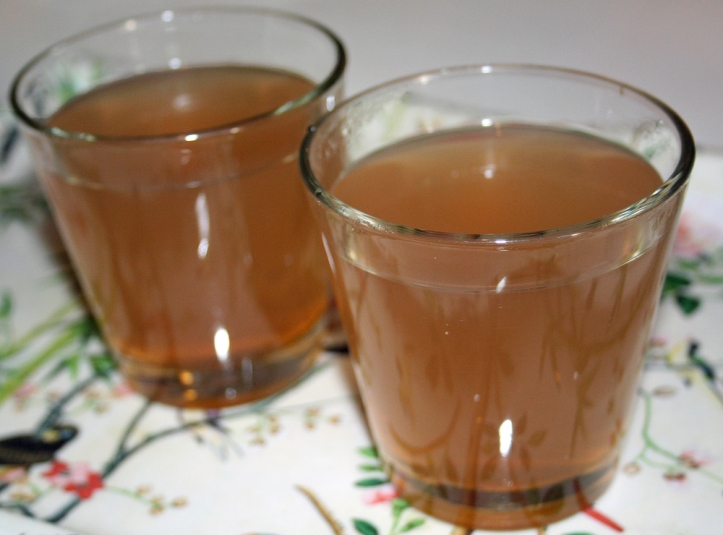
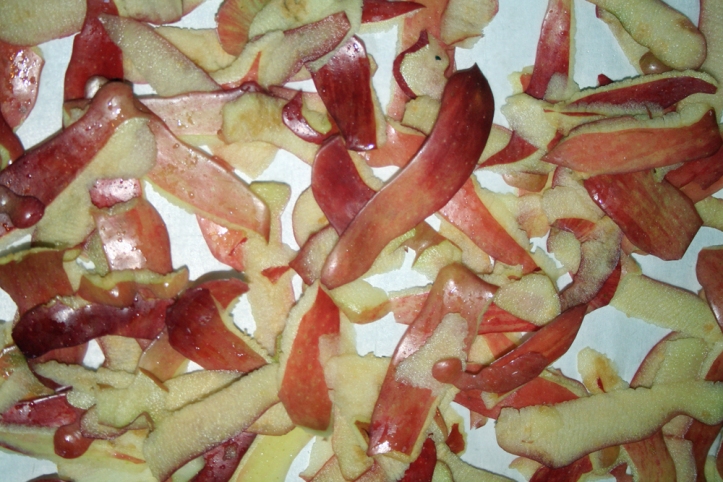
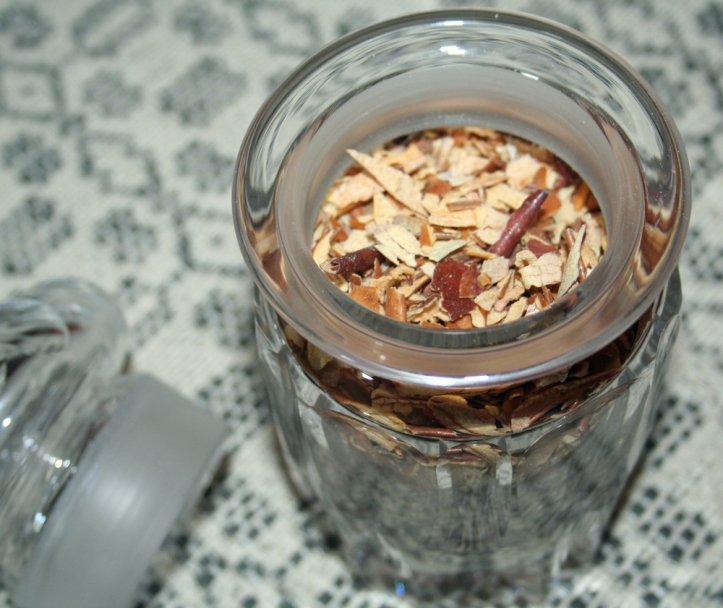
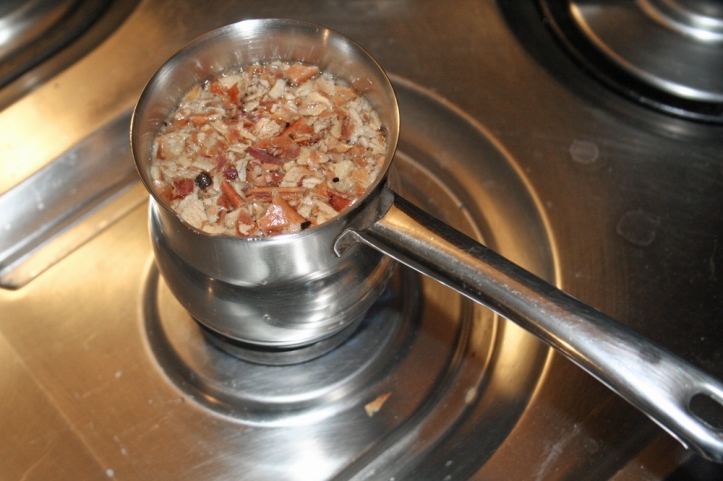
Debi, what a coincidence. I was just reading that recipe with interest the other day. It is indeed a great use for Apple peels.
LikeLike
The tea was a revelation. I never thought that dried apple peel would have enough flavour still in them to produce a cider-like drink. I substituted allspice berries for the cloves in the original recipe as I am not all that fond of cloves and I think they tend to overpower the other flavours.
LikeLike
Lovely! And I love that lemon balm is called melissa (I’m all about the bees) 😀
LikeLike
Of course, my name means bee, so I am also fond of lemon balm or melissa. Interesting how many of the Greek names are similar to the ones we use.
LikeLike
Yum! Love apple tea and this is a great way to use up the peels when I’m stewing fruit in the winter months for my breakfasts. 🙂
LikeLike
You will love it. I have already converted several people here and they are now saving all their apple peels. I wonder how it would taste with different varieties of apples? I wonder if ladyredspecks would do an experiment like she did on apples?
LikeLike
I but apple tea imported from Turkey, with rosehips. It’s very refreshing. I heard apple tea referred to very derisively as “tourist tea” when I was in Turkey. How are your Greek language skills coming along?
LikeLike
As to those language skills – σιγά-σιγά (little by little). I’m okay with individual words, but stringing sentences together is still difficult. Despite the fact that it is ‘tourist tea’ it is still delicious. Adding rosehips sounds interesting. I like rosehips on their own, but can see how they would add to the body of this tea.
LikeLike
Herbal tisanes are responsible for spiking my interest in food and flavours as a young teenager! I will always have a soft spot for fragrant brews such as this. And I love the frugality of drying apple peels for tea – great idea!
LikeLike
I was truly amazed at how the apple flavour came through just from peels. I, too, love the frugality of it. It was either make tea or make apple vinegar. The tea won!
LikeLike
Made my mind wander back to a visit to Turkey last year…I must admit to finding the ‘tourist tea’ a tad too sweet but with this recipe you could easily vary that….
LikeLiked by 1 person
I agree ‘tourist apple tea’ is very sweet. The beauty of making your own is the ability to sweeten to taste or omit additional sweeteners altogether.
LikeLiked by 1 person
Quite!
LikeLike